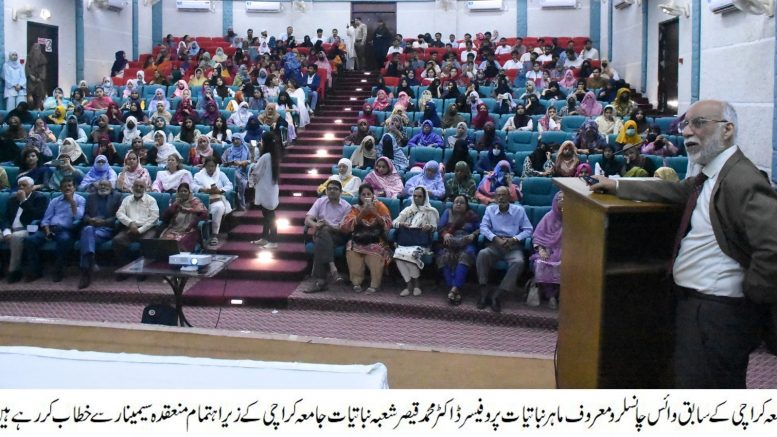Karachi (HRNW)- The biggest problem of Pakistan is its rapidly growing population. The total population of both East and West Pakistan in 1947 was around 7.5 million while today the population of Pakistan is about 240 million, due to various factors, the arable land is shrinking, and the country is also facing challenges like global warming and climate change that has caused food shortage.
We claim to be among the fifth or sixth largest producers of wheat and rice in the world but, due to our rapidly growing population, we will face dire consequences if we do not act in this regard on an emergency basis. We must protect plants and animals to combat climate change and find new plants to make medicine and fight malnutrition.
These views were expressed by the renowned botanist and the former vice chancellor of the University of Karachi Professor Dr Muhammad Qaiser during a seminar on ‘plant biodiversity and food security’. The KU Department of Botany organized the event at the Karachi University Business School Auditorium on Friday.
He discussed the importance of biodiversity and the causes of the fast depletion of biodiversity with a special reference to Pakistan in detail.
During his keynote address, Dr Qaiser mentioned that Pakistan is among the countries which are most affected by climate change and there is a very high possibility that Pakistan may face severe water shortage in the future.
“There are laws related to reducing deforestation in Pakistan but it is not implemented which is affecting the entire country today. Climate change is wreaking havoc, especially by increasing the global temperature and drought.”
On this occasion, the KU VC Professor Dr Khalid Mahmood Iraqi said that food security is an important issue for developing countries like Pakistan, and stressed that we need to develop new food grains. He shared that science has brought revolutionary changes in the field of medicine. He added that plant medicine could help the country against various diseases.
He observed that we need a balanced ecosystem, balanced diet, and a lifestyle, climate change has also affected Karachi a lot.
“Biodiversity is very essential to our life. Efforts should be made at government and public level to build connection with the natural world and protect biodiversity.”
Earlier, the KU Dean of the Faculty of Sciences Professor Dr Musrat Jahan Yusuf said that India and Bangladesh are using modern technology to meet their food needs as well as ensure the protection of agricultural land and commodities, unfortunately, we have not adopted those latest tools and technology which could be helpful for us.
“Our researchers also try to find ease in research, we can get better results if we make more efforts in our research and studies.”
The former Director General National Institute of Oceanography Dr Shahid Amjad opined that Pakistan spans many ecological biomes worldwide. These ecoregions include the mountain biome, the desert biome, the temperate grassland biome, the tropical forest biome, coastal and marine, lakes, rivers, wetlands, and others.
He mentioned that biological diversity includes both species richness and evenness. Communities with a large number of species that are evenly distributed are the most diverse, and communities with few species that are dominated by one species are the least diverse.
According to him, biological resources are renewable and can even increase with proper sustainable management and conservation techniques. Biodiversity has both ecological and economic value. The biodiversity values should be reflected in our national accounting systems.
The KU Chairperson of the Department of Botany Professor Dr Rubina Abid emphasized the conservation of biodiversity. She said that plants are the only harvesters of energy on the planet earth.
She urged students and young scholars to develop insights into the deadly issue of food shortage and come up with solutions and strategies to conserve the plant species and their utilization as food crops.
